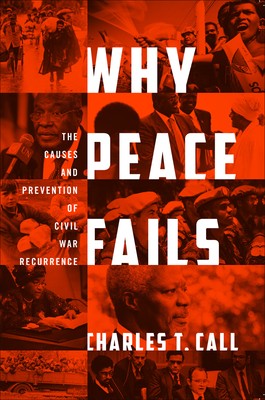
- We will send in 10–14 business days.
- Author: Charles T Call
- Publisher: Georgetown University Press
- ISBN-10: 158901894X
- ISBN-13: 9781589018945
- Format: 16.1 x 22.9 x 2.1 cm, softcover
- Language: English
- SAVE -10% with code: EXTRA
Reviews
Description
Why does peace after civil war, once it is widely seen as consolidated, often fail to hold? What explains why peace "sticks" after some conflicts while others reignite? This is an important topic because civil wars have resulted in more deaths worldwide than any other form of organized violence since the end of the Cold War. Furthermore, the failure of peace has often led to doubly devastating conflicts the next time and recurring conflicts are particularly difficult for international peacekeeping efforts. This groundbreaking study finds that multiple factors account for the success of consolidating peace and averting a resumption of civil war, but Call's key finding is that one factor in particular, political exclusion, plays the decisive role in most cases where armed groups have resumed conflict. Call also finds that political inclusion of former opponents is highly correlated with the successful consolidation of peace. This book is a corrective to a trend in recent scholarship that has attributed the resumption of conflict primarily to economic factors such as natural resources. This study has important implications not only for scholarship but also for conflict resolution practitioners who design programs to help build peace in war-torn societies. The particular cases of conflict analyzed in the book are Burundi, Chechnya, Central African Republic, East Timor, Haiti, Lebanon, Liberia, Mali, Nicaragua, Peru, South Ossetia, Rawanda, Sudan, Tibet, and Zimbabwe.
EXTRA 10 % discount with code: EXTRA
The promotion ends in 20d.02:50:35
The discount code is valid when purchasing from 10 €. Discounts do not stack.
- Author: Charles T Call
- Publisher: Georgetown University Press
- ISBN-10: 158901894X
- ISBN-13: 9781589018945
- Format: 16.1 x 22.9 x 2.1 cm, softcover
- Language: English English
Why does peace after civil war, once it is widely seen as consolidated, often fail to hold? What explains why peace "sticks" after some conflicts while others reignite? This is an important topic because civil wars have resulted in more deaths worldwide than any other form of organized violence since the end of the Cold War. Furthermore, the failure of peace has often led to doubly devastating conflicts the next time and recurring conflicts are particularly difficult for international peacekeeping efforts. This groundbreaking study finds that multiple factors account for the success of consolidating peace and averting a resumption of civil war, but Call's key finding is that one factor in particular, political exclusion, plays the decisive role in most cases where armed groups have resumed conflict. Call also finds that political inclusion of former opponents is highly correlated with the successful consolidation of peace. This book is a corrective to a trend in recent scholarship that has attributed the resumption of conflict primarily to economic factors such as natural resources. This study has important implications not only for scholarship but also for conflict resolution practitioners who design programs to help build peace in war-torn societies. The particular cases of conflict analyzed in the book are Burundi, Chechnya, Central African Republic, East Timor, Haiti, Lebanon, Liberia, Mali, Nicaragua, Peru, South Ossetia, Rawanda, Sudan, Tibet, and Zimbabwe.


Reviews